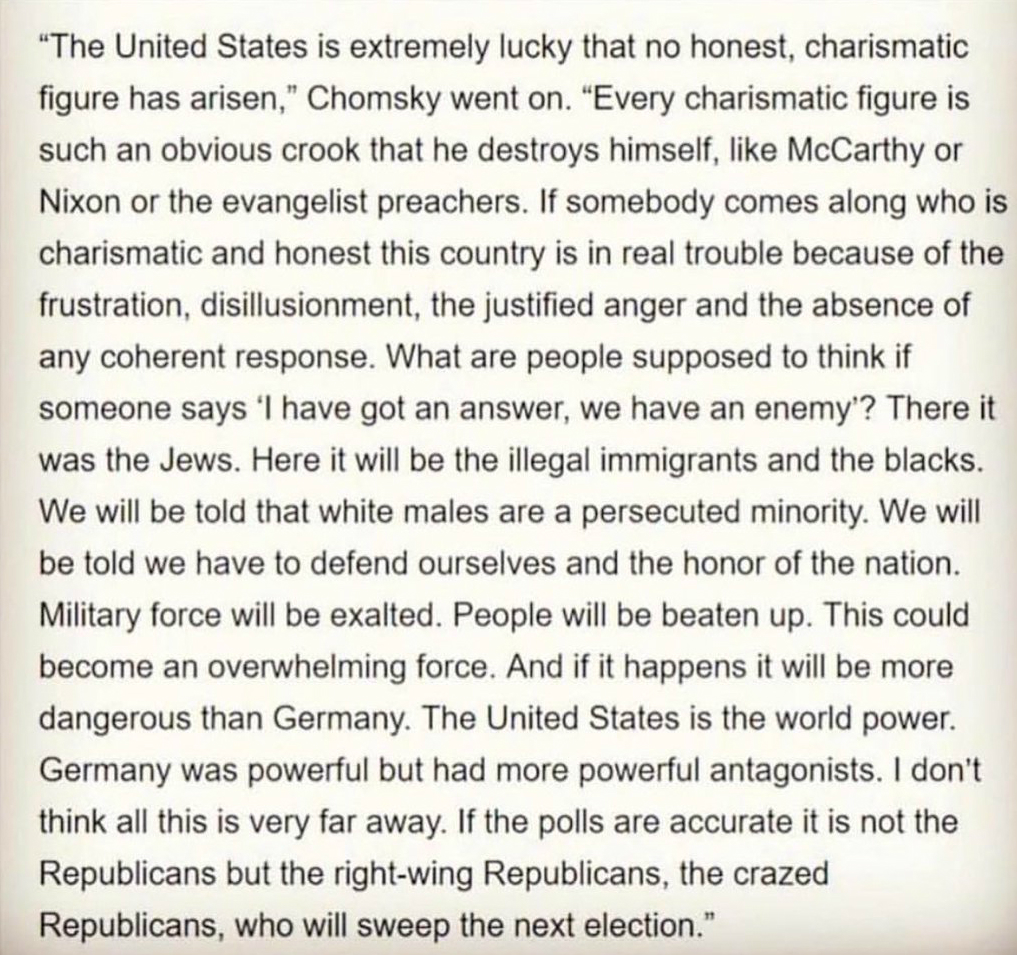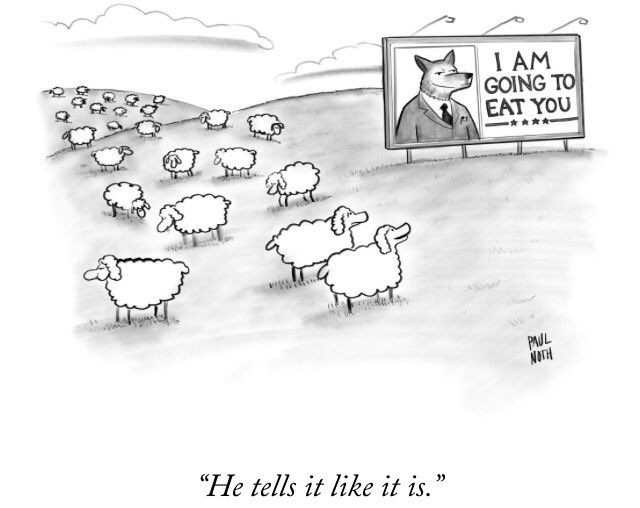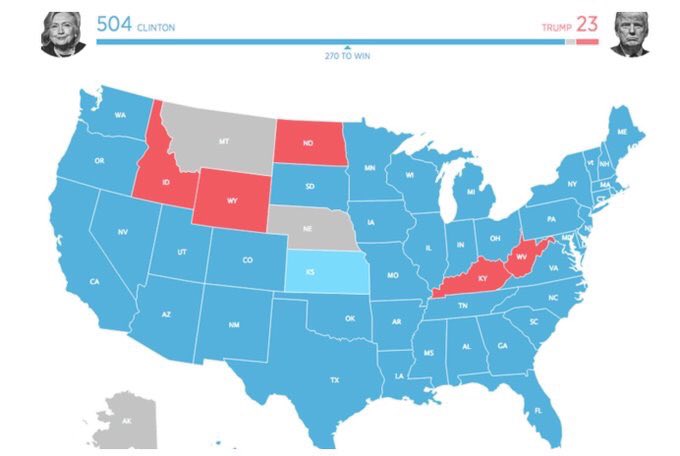I know, I know. It feels like Christmas morning on death row.
I am sure the Interwebs contain its fair share of Wednesday morning quarterbacking about what went wrong, who’s to blame, etc. and what to do now.
I’m not going to offer anything different. Probably nothing original (I haven’t read any post mortems yet). But here goes anyway.
Let’s get a few things out of the way.
Russia didn’t hack us.
Voter suppression efforts – systemic and otherwise – don’t account for Trump’s victory.
Third party candidates and their voters are not to blame. (And no, Bernie would not have done better — he would have done worse).
It wasn’t dunderhead Comey’s glorious re-opening of a BS investigation either.
Let’s accept facts (because that’s what we do): the political system, albeit flawed here and there, worked the way it was supposed to.
Here’s my explanation in a nutshell: Donald Trump is the inevitable result of almost thirty years of government mistrust, cultivated by right wing media (AM radio, the fringes of the Internet), coupled with an inert mainstream media driven by ratings (or “clicks”) rather than journalistic values of revealing and presenting the truth. (UPDATE: to be clear, I think the media did just fine exposing Trump for who he is. The problem is, much of the electorate didn’t care. And the reason they didn’t care is because of failures of the media in the past with their false equivalences. In other words — the media practiced journalism too little, too late)
[He also got lucky too. I mean 60 percent of voters viewed him unfavorably, yet he got 15% of those voters to vote for him. 63 percent of voters said they didn’t think he had the “temperament” to be president, he got 20% of those voters to support him. 60 percent of voters said they didn’t think he was qualified to be president and yet 18 percent gave him their vote.That’s a lot to digest, perhaps. But I come at this from the perspective of someone who has been around for more than half a century — a person who has more yesterdays than tomorrows.
Ronald Reagan wouldn’t recognize the Republican Party today, but he laid the seeds of popular discontent. He famously said: “The most terrifying words in the English language are: I’m from the government and I’m here to help.” It was a glorious departure from the concept that we have a government of self-rule, i.e., that this is a government OF the people. Reagan’s famous quote created — or certainly popularized — the notion that government was something OUTSIDE the populace — an alien entity imposed on the people, rather than working for the betterment of people.
To give him credit, I think Reagan was merely talking about government overreach — or Big Government as it was called — and not government as an institution. But others, like Rush Limbaugh, latched on to the concept and starting in the mid eighties, “government” became a dirty word.
This derision was in full swing by the early 1990s. Although politicians still debated the SIZE of government, there was an undertone growing that government of ANY kind was evil — a necessary evil (some would generously say), but an evil nonetheless. And why? Because the more government, the less freedom. That was the rationale.
And it’s true. Government denies you the freedom to kill other people, for example. I use that example to demonstrate that freedom, in its purest form, is not all it is cracked up to be, and government is not only necessary, but a morally good thing. But I digress.
So here were are thirty years later, and the myth of “government is bad” has soaked up into a population so cynical that most people have not only rejected government as an institution, but many other institutions as well. Media. Education. Science. Medicine. To many people, they these things are simply…. bad.
During this time, there have been two kinds of Republicans: the cynical and disenchanted that I have already discussed, and those in power willing to take advantage of the cynical and disenchanted (for political or monetary gain). And when you have those two elements, the cynical being mislead by the opportunistic, is it any wonder that Donald Trump emerges as a political force?
And if that’s too abstract for you, let’s turn to history. Nazi propagandist Goebbels proved that if falsehoods were repeated often enough they became, in the minds of the ignorant and aggrieved, facts. He proved that the selection of a false enemy was essential as a target of aroused bigotry. That, too, required constant repetition to create the hated “other.” Although “the other” lived peaceably as a minority in the population it should be characterized as inimical to the interests of the majority.
Time for some Chomsky from 2010:
It is too simplistic to say that Trump’s followers are all racist. Racism definitely exists, and I could write an opus on its pervasiveness. But what Trump followers really object to, if you want to describe most of them, is multiculturalism. Objection to multiculturalism is what explained the Brexit vote by the way. Aversion to multiculturalism doesn’t require out-and-out bigotry and hatred, but it does establish the “other” and blames the “other” for society’s ills. Mexicans, Muslims, refugees from other countries — Trump played into those fears beautifully. He understands that even non-racists have misgivings — not hatred, but ill-defined concerns — of “the browning of America”.
And consider this: The Constitution was designed to benefit a rural agrarian society, which the country was at the time (and the Founding Fathers were almost all farmers). The Electoral College itself was designed to ensure regional balance. The fear at the time was that by allowing the popular vote, the candidates from urban areas would always win. But the Electoral College ensured that couldn’t happen, since every state (even ones without urban populations) get a proportional “say”. Even today, there are many rural and small-state elites who fear that under a national popular vote system, they’d be ignored and elections would be decided by people who live in cities in an “urban power grab”.
That may be true, by the way. But the Constitution’s “fix” of the Electoral College means that the individual voters in rural regions are given more power than they would have in a pure democracy where everyone’s vote is truly equal.
Think about it. In a presidential race, why should a voter living in Walkertown NC be of more interest to a presidential campaign than a voter living in Los Angeles? She shouldn’t, but she clearly is — and the Electoral College makes it so. You want to talk about a “rigged” system? Well, if your goal is a PURE democracy, the Electoral College is where the “rigging” is.
A mobile society makes the need for the Electoral College obsolete. Most of us are not individual farmers anymore. Most of us can make a living anywhere nowadays. And while there may be variances at the STATE and LOCAL level (roads and police), the NATIONAL needs of someone living in Los Angeles are pretty close to those of someone living in Walkertown NC. We want to be protected from invasion/war. We want an economy that works for us. These are our main NATIONAL concerns.
In fact, the only thing that really separates “urban” and “rural” people in the 21st centuiry is their exposure to . . . here it comes . . . “the other”. Who is less likely to be cool with multiculturalism? People in rural areas, who are troubled by the presence of funny looking people from other places with their strange ways and odd language. Is it any wonder that a not-very-thinly-veiled white nationalist ideology resonates with them? Especially on the heels of an African-American presidency?
And because of the Constitution, rural areas loom larger from an electoral perspective, while left-leaning urban centers carry less political weight. That is why Trump wins the electoral vote, while Hillary wins the popular vote (when all votes are counted).
I suspect the majority of Americans do have a problem with the concept of multiculturalism, but it can make the difference in a close election. Trump was catering to a white minority, still fearful (or confused or ignorant or hateful — pick your adjective, they all apply … depending) of people they don’t know/like/understand.
So there’s that . . . and trade (which if you think about closely, is also about multiculturalism as well). We HAVE lost a lot of manufacturing jobs, which has served as the bread and butter of the non-college educated worker — male and female. NAFTA had a lot to do with it, but — to be honest — so did mechanization. The truth is — and I apologize for the wonkiness — we cannot compete with third world countries who can manufacture goods far more cheaply, unless workers here are willing to accept wages at $7 per hour or even lower. And they can’t. Our workers need to be trained for high-tech jobs (computer programming, etc.) and given the terrible condition of our education system, that isn’t going to happen.
So… in steps Trump. A con man. He either feels it himself, or he cynically exploits this populist discontent from rural areas and non-college educated demographics. Either way, once you have distrust of institutions in your pocket, it doesn’t matter what other shortcomings you have.
I mean 60 percent of voters viewed him unfavorably, yet he got 15% of those voters to vote for him. 63 percent of voters said they didn’t think he had the “temperament” to be president, he got 20% of those voters to support him. 60 percent of voters said they didn’t think he was qualified to be president and yet 18 percent gave him their vote. Think of that — millions of people voted for Trump even though they believed he was UNQUALIFIED!!
So of COURSE he does well in the GOP primary as the outsider non-institution candidate. And that carried over into the general. I think that will be the judgment of history.
The problem for the Republicans (and the Rush Limbaughs and the Alex Jones and everyone who has built or exploited this machine of anti-institution cynicism) is that THEY OWN THIS NOW. They’ll be no more blaming others, brown people, women, and the Clintons. Trump is not the “outside” change agent anymore. He’s President of the United States — the ULTIMATE insider.
And like the dog who caught the car, now he has to DO something. He has to deliver. The wall. Repeal healthcare and overnight make 20 million lose insurance. Getting rid of 11 million “illegals” (somehow).
Simply put, Trump has a yuge problem. He can’t deliver on his promises. And even if he could, people may find that they won’t like the result (Example: You want manufacturing to come back to America in big way? Fine, but say goodbye to Walmart and Target. You want a wall between US and Mexico? Fine, but enjoy the retaliatory trade war.)
I won’t even begin to talk about how these people have voted against their interest. This New Yorker cartoon, however, said it best:
Anyway, since I’m almost there anyway, I need to turn to the future and talk about that.
It’s going to be rough for a while. My hope is that the Supreme Court will see Trump for the historical aberration that he is, and justices like Roberts and Kennedy will act as a bulwark to drastic changes, even if we get some bad picks.
But I am also optimistic. Just as the Renaissance came after the Dark Ages, like the fact that beautiful flora grow from piles of shit, like a phoenix rising from the ashes…. oh, let me come back down and say it simply: I think the next few years are going mark the last stand for a dying ideology and the dawn of American 3-point-oh. Let me ‘splain.
Look, I came into my political cognizance in the 1980s, a decade marked by political apathy when it came to young people. I don’t see that anymore, especially with the young people. For my friends with children who worry about what to tell them, tell them this:
That’s the electoral map this morning if only 18 to 24 year olds voted. So you tell your kids that they are witnessing the death throes of a mindset that worships at the altar of fear and ignorance and hatred. Tell them they are part of the a generation which has the potential — finally — to rid this country of the burdens of racism, sexism, and any and all of the other isms.
The youth of today (and even some older people) are about to get an education in what this country can be when the worst of human nature becomes normalized. It’s like we’ve planted a bug bomb under the sink, and all the cockroaches are scurrying out onto the kitchen floor. It’s nasty as hell, but now the ugliness is out in the open where we can see it, point to it, and get rid of it.
I think the themes of this election season need to be the themes of our fight ahead. Particularly these two:
(1) “Stonger, together” = embrace multiculturalism. In life. In art, In words. In deeds.
(2) “When they go low, we go high” = don’t engage in the tactics they engaged in (obstructionism, hate).
Trumpism will fail. And don’t think I’m like some pundits were, who WISHED Obama to fail. I don’t want to see any U.S. President fail. But I am confident that Trump will. And I like what comes afterward. And that’s what we should tell our kids: “Watch this. Learn and remember”
And you tell the kids that in other countries, a change in leadership this drastic usually comes with a death toll. Ultimately, the system works, even when it doesn’t in the short term.
And remember, what democracy does, it can also undo. Roy Cooper was elected governor in a conservative state that went for Trump. Why? Because there are limits, even here. Trump is one man. The checks and balances of the Constitution (which he hasn’t read) work, and I don’t believe Trump knows about checks and balances yet. In the meantime, we can start at the local level making the changes we want (which is what the Republicans have been doing for decades).
We’ll get through this. I have faith in the system. I have faith in the people of the country. And, most of all, I have faith in the young people of today. Tell your kids that you have faith in them, too. Ultimately, they will get it right even if my generation failed.
Finally, enjoy the coming counterculture (did you know that the arts flourish in times like these?). Enjoy getting involved. As one person wrote recently, “Maybe it is time to be a little more punk, and a little less Dad rock.” I think that applies to activism as well.
And by the way, we don’t have to respect a Trump presidency. We don’t have to come together as a nation. Progressives know how to respect the institution, while opposing those who run them.
History IS happening. The adventure begins.
UPDATE: It’s begun. A spontaneous student walkout in Austin TX. The kids are alright.




